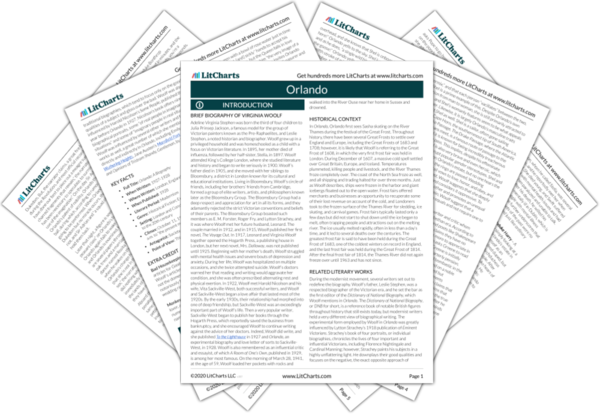Writing and Literature
Virginia Woolf was an important artistic contributor to the modernist movement of the 20th century, which sought to break from traditional forms of artistic expression. Modernists like Woolf believed that traditional forms of writing—be it poetry, prose, and even biography—were a poor fit for their new and changing world. The early 20th century saw sweeping changes politically, socially, and economically—and since the world was changing, modernists figured, so should art. Woolf’s Orlando is one such…
read analysis of Writing and LiteratureSubjectivity, Truth, and Biography
In Orlando, Virginia Woolf implies that biographies of the past have failed to effectively capture a subject because they rely too heavily on what is perceived as objective fact. The book’s subject, Orlando, is a fictional character based upon Woolf’s real-life friend and lover, Vita Sackville-West, and Orlando’s unbelievable life spans some 400 years. Orlando is also a history of English literature, and it was written specifically with Woolf’s elite circle of friends…
read analysis of Subjectivity, Truth, and BiographyGender and Society
In one of the more surprising moments of Virginia Woolf’s Orlando, Orlando wakes after an inexplicable coma-like sleep of seven days to find himself transformed into a woman. Orlando is the fictional representation of Woolf’s own friend and lover, Vita Sackville-West, and Orlando’s seemingly easy transition from male to female reflects Woolf and, presumably, Sackville-West’s, own understanding of gender. Both Woolf and Sackville-West were members of the Bloomsbury Group, an elite group of writers…
read analysis of Gender and Society
Identity and Transformation
Orlando, the protagonist and title character of Virginia Woolf’s Orlando, undergoes profound personal and physical changes in the novel, and he lives in a world that likewise drastically transforms. When the narrator first introduces Orlando, he is a young boy of 16 in Elizabeth I’s court, sometime around the mid-1670s. By the end of the novel, however, Orlando is a 36-year-old woman who gets out of her car on “the twelfth stroke…
read analysis of Identity and Transformation











